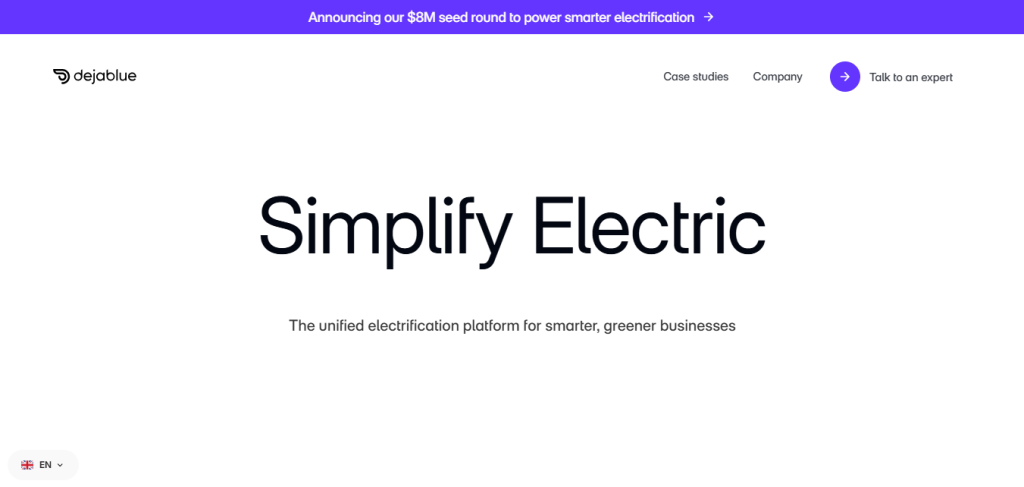DejaBlue Raises $8M Seed Round to Build the Future of Water Intelligence
July 6, 2025
byFenoms Startup Research

DejaBlue, a climate tech startup pioneering real-time water monitoring and predictive infrastructure tools, has secured $8 million in seed funding to address one of the planet’s most pressing challenges: the growing threat of water insecurity and infrastructure failure. The round included top investors such as Redalpine, Zeno Ventures, and Bpifrance, backing DejaBlue’s vision to create a modern, data-driven layer for global water systems.
The company is led by co-founder Parker Spielman, whose background in environmental data and systems design is fueling a mission to prevent the next water crisis before it happens.
Fixing the Blind Spot in Global Water Infrastructure
Water infrastructure is aging fast - and failing silently. In many cities across Europe and North America, over 30% of distributed water is lost to leaks, while outdated monitoring tools make it difficult to detect problems until they become catastrophes. From lead contamination in public schools to drought-hit regions relying on outdated supply chains, the cracks in our water systems are widening.
DejaBlue’s platform brings real-time visibility, AI-powered alerts, and predictive analytics to water networks. By combining edge sensors, machine learning models, and intuitive dashboards, the startup gives utilities and municipalities a way to monitor water quality, pressure, usage, and leak risk - at scale.
According to Spielman, “Water systems are the last analog stronghold in a digital world. DejaBlue is here to change that - because every drop should be tracked, trusted, and intelligently managed.”
The Capital Behind the Mission
The $8M seed round will go toward scaling DejaBlue’s engineering team, expanding pilot projects across Europe and North America, and investing in partnerships with cities, private utilities, and infrastructure planners. Backers include:
- Redalpine, known for its bold bets in deep tech and frontier sustainability,
- Zeno Ventures, focused on backing system-shifting innovations,
- and Bpifrance, the French public investment bank supporting global climate champions.
These investors share a common thesis: the 21st century’s infrastructure problems won’t be solved by pipes and pumps alone - they’ll be solved by software.
The Market Is Catching Up
The smart water management market is projected to surpass $90 billion by 2032, driven by climate resilience mandates and rising urban demand. DejaBlue sits at the intersection of utility modernization and climate tech - an intersection that governments and ESG-backed funds are actively trying to accelerate.
Already, regulatory frameworks in the EU and U.S. are shifting to require real-time leak detection, non-revenue water tracking, and consumption optimization. DejaBlue is helping utilities meet these targets not with hardware overhauls - but with cloud-based orchestration layered onto their existing systems.
Why This Moment Matters
timing couldn’t be more urgent. By 2030, global demand for water is expected to outpace supply by 40%, according to the UN. Cities worldwide are already struggling with outdated pipes, water theft, chemical runoff, and aging maintenance practices. In the U.S. alone, the EPA estimates a $472 billion gap in drinking water infrastructure investment over the next 20 years.
Climate volatility is compounding the issue - floods, droughts, and population shifts are stressing legacy systems that were never designed for the current pace of change.
And yet, most water utilities still operate with minimal data - relying on monthly meter reads, manual inspections, and reactive maintenance cycles. DejaBlue is stepping in to close this intelligence gap, giving utilities the tools to transition from reactive to predictive operations.
What Founders Can Learn From This Model
DejaBlue isn’t trying to outcompete big legacy vendors on pipe manufacturing or municipal lobbying. They’re bypassing all of that - by becoming the digital nerve system that existing infrastructure plugs into.
In legacy-heavy industries like water, disruption doesn’t come from replacing the system - it comes from quietly embedding into it. When your product becomes the decision-making layer inside slow-moving systems, you don’t need to own the pipe - you just need to own the signal.
This kind of embedded intelligence - especially in sectors where capital turnover is slow - builds a moat that isn’t just technical, but political. That’s how modern climate tech startups scale without fighting incumbents head-on.
A Growing Market With Global Tailwinds
The water tech market is experiencing a global shift, projected to surpass $90 billion by 2032, with real-time monitoring solutions seeing double-digit CAGR. Regulatory mandates, environmental pressures, and increased public scrutiny are accelerating adoption.
From California’s smart meter policies to EU urban water strategy revisions, governments are actively seeking partners who can provide reliable, scalable intelligence. DejaBlue’s modular platform is designed to be deployed incrementally - fitting both small municipalities and large utilities without full system overhauls.
Moreover, the rise of ESG and green bonds means utilities are under more pressure than ever to quantify impact - something DejaBlue’s system enables with data-driven reporting and environmental tracking.
Meet the Founders Behind the Vision
Parker Spielman, co-founder and CEO, brings a background in climate systems, data architecture, and operations. He previously worked in environmental modeling before launching DejaBlue to solve the systemic blind spots he encountered firsthand.
Spielman’s team includes specialists in fluid dynamics, AI, and civic infrastructure - combining mission-driven tech culture with the rigorous demands of public sector reliability.
What’s Next for DejaBlue?
With $8 million in the bank, DejaBlue plans to:
- Expand pilot programs across France, Germany, and the U.S.
- Launch new predictive models for leak detection and water quality
- Integrate ESG and carbon tracking tools into city dashboards
- Build out an API layer to connect with existing smart grid and utility systems
Long term, the company envisions a world where water isn’t just delivered - but understood, forecasted, and optimized in real time.









